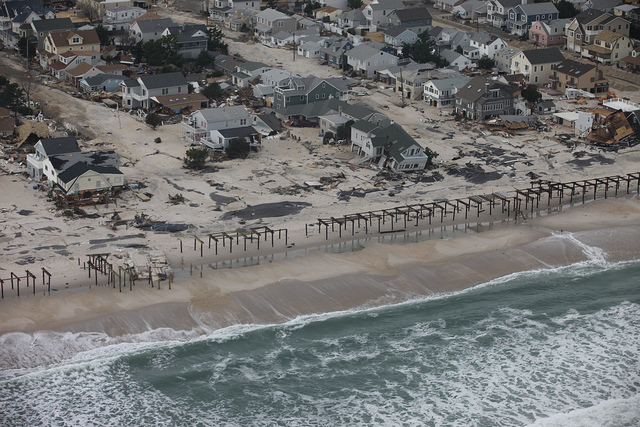New Jersey Future Blog
What’s Next in the New Jersey Highlands?
March 21st, 2012 by Chris Sturm
After Highlands Council Executive Director Eileen Swan was dismissed last week, we congratulated her on a job well done. Then we asked ourselves, what next?
According to a story in the Daily Record, council Chairman Jim Rilee said it would be easier with a new executive director to make changes to the Regional Master Plan that will help landowners in the region. One hopes the council will remember that its greater responsibility under the Highlands Water Protection and Planning Act is to help all the citizens of New Jersey by implementing the Regional Master Plan – a plan designed to identify areas for growth and preservation that will protect the drinking water enjoyed by more than half the state’s population.
After all, 91 percent of New Jersey residents believe “protecting our drinking water supply” is very important, compared to 88 percent who attach the same importance to “attracting new businesses and creating jobs,” according to a recent Monmouth University poll. And residents overwhelming believe the state should protect areas like the Pinelands and Highlands (58 percent say it is very important, 28 percent somewhat important). Both of these findings suggest that New Jerseyans expect the council to place a higher priority on protecting the Highlands and its drinking water than helping landowners.
Let’s assume that the Highlands Council, with Governor Christie’s support, will in fact take action that respects the will of the Legislature, fulfills the wishes of residents and protects New Jersey’s future. What should be at the top of their agenda?
- Hiring a qualified executive director, chief counsel and planning director. (Note that acting Highlands Executive Director Dan Van Abs will retire in June, and Chief Counsel and Deputy Executive Director Tom Borden resigned last week.) It is essential that their successors possess experience and professional credentials in the areas of regional land use planning, land use law, water protection, smart growth and intergovernmental coordination.
A good job description for the executive director would be the following:
- Demonstrated ability to manage, lead and inspire a hard-working, dedicated team.
- Strong communications skills and experience with different levels of government, including municipal government, which aids in partnering, and state government, which aids in garnering resources.
- Knowledge of land use planning (state and regional) and land use law.
- Environmental protection experience.
- Ability to supervise professionals in planning, land use law, water and wastewater infrastructure and environmental resources.
- A strong work ethic and willingness to work nights to meet with municipalities.
- Continuing the council’s work to implement the Regional Master Plan in partnership with municipalities through the conformance process. This process encourages municipalities to revise their master plans and land use ordinances to be consistent with the Regional Master Plan. Conformance is mandatory in municipalities located in the Preservation Area; it is voluntary, but no less critical, in municipalities located in the Planning Area. So far, 33 percent of lands in Planning Area municipalities are in conformance. The next step in these towns is to adopt effective implementing ordinances and planning initiatives, which is complicated and requires a strong partnership with the Highlands Council. With 20 additional petitions submitted but not yet approved, the opportunity is at hand to bring much more of the Planning Area into conformance – but only if there is sufficient staff, and qualified leadership, to accomplish this task.
- Advocating for appropriate state funding to preserve priority preservation lands and provide incentives for infrastructure, brownfield cleanups and economic development to advance growth in adopted centers and redevelopment areas. The new executive director will have to be an effective advocate in Trenton.
- Completing the council’s work to help municipalities update wastewater management plans. To date, the council has completed 10 municipal draft plans, two of which have gone to public comment. The council may draft as many as 35 municipal WMPs. Updating these plans promotes smart growth by designating where sewers may go, while protecting environmentally sensitive areas from intense development. Success depends upon close cooperation with the DEP and the counties.
Landowners, both small and large, benefit from good planning. The New Jersey Pinelands Commission, a national success story, has shown that regional planning is good for residents’ pocketbooks. Municipalities in the Pinelands region enjoy better economic health than municipalities in the non-Pinelands towns of South Jersey, as measured by unemployment rates, property taxes, property values, growth of new business establishments and “effective tax rates,” a key indicator of municipal fiscal stress. And New Jersey residents benefit from clean, affordable drinking water, and living somewhere known not for suburban sprawl but for strong communities and healthy green spaces.
Now, more than ever, the Highlands Council has its work cut out for it. We wish it the best of luck in fulfilling its statutory obligation to implement and enforce the Highlands Water Protection and Planning Act. New Jersey needs it – and our residents demand it.


















Dear NJ Future:
Your basic assumption not only lacks any supporting facts, virtually all available facts contradict it. I am referring, of course, to this assumption:
“Let’s assume that the Highlands Council, with Governor Christie’s support, will in fact take action that respects the will of the Legislature, fulfills the wishes of residents and protects New Jersey’s future. ”
Because that assumption is so unrealistic and contradicted by facts, it amounts to little more than political cover for the Governor.
I also strongly differ regarding the likelihood of attracting a quality new Executive Director. On March 19, I explained why:
“From a governing standpoint, Chairman Rilee has destroyed his own personal credibility and ability to lead the Council.
“Despite the fact that the plan to fire Swan was leaked and reported in the media well before the public hearing (thus giving plenty of time for the Governor’s Office to reconsider and save face), they went forward with it anyway.
“Rilee maneuvered behind fellow Council members’ backs, was dishonest during his Senate confirmation, and thereby has made it impossible for anyone to trust him. Ever.
“Rilee has destroyed the Council’s independence and shown that it is little more than a pawn of Trenton and Governor Christie.
“Rilee has deeply and irrevocably polarized the work of the Council. Conservation groups are on the warpath and the Council’s public perception as a professional regional planning entity and an honest broker has vanished.
“Given these circumstances, what kind of planning professional would want to take the Executive Director’s position and replace Swan?
“Is the Rilee hand picked new Personnel Committee deluded to think they can conduct a national search and attract a strong candidate?
Rilee has made it virtually impossible to attract a qualified professional replacement.”
But, breaking the Council just may have been the Governor’s goal here.
Full post:
http://www.wolfenotes.com/2012/03/reflections-on-a-highlands-massacre/
To: New Jersey Future
I sent the following email to the Governor on 3/22:
I am deeply disturbed by the preemptory manner in which the Executive Director of the Highlands Commission was dismissed after 5 years of exemplary work.
In an honest society things like this should not happen. There was no just cause to summarily dismiss Ms. Swan unless it was to sabotage the basic goals which established the Highlands land and water protections.
Looking beyond immediate political goals, the watering down of the work of the Commission by a more malleable Executive Director is short sighted in our long term efforts to protect the Highlands and the water it provides for millions of New Jersey residents.
This and other recent acts to lessen environmental protections (waiver rule, RGGI pullout, permit extensions) are creating an anti-environmental record for the Christie administration without whose encouragement these things would not occur in New Jersey, the most densely populated state whose residents have never
voted down a Green Acres funding referendum.
I hope that, as Governor, will reconsider the individual and cumulative effects of your actions.
Grace Sinden